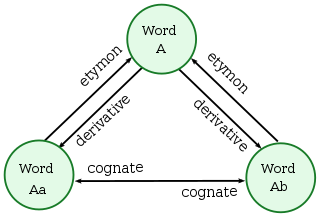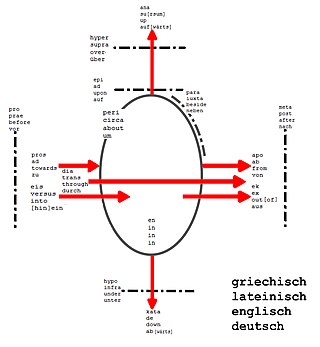
In historical linguistics, cognates or lexical cognates are sets of words that have been inherited in direct descent from an etymological ancestor in a common parent language.

A prefix is an affix which is placed before the stem of a word. Particularly in the study of languages, a prefix is also called a preformative, because it alters the form of the word to which it is affixed.
International scientific vocabulary (ISV) comprises scientific and specialized words whose language of origin may or may not be certain, but which are in current use in several modern languages.
Adpositions are a class of words used to express spatial or temporal relations or mark various semantic roles. The most common adpositions are prepositions and postpositions.
The following are lists of words in the English language that are known as "loanwords" or "borrowings," which are derived from other languages.
Etymology is the scientific study of the origin and evolution of a word's meaning across time, including its constituent phonemes and morphemes,. It is a subfield of historical linguistics, philology, and semiotics, and draws upon comparative semantics, morphology, pragmatics, and phonetics in order to construct a comprehensive and chronological catalogue of all meanings that a morpheme, phoneme, word, or sign has carried across time.
The Greek language has contributed to the English lexicon in five main ways:
Although English is a Germanic language, it has significant Latin influences. Its grammar and core vocabulary are inherited from Proto-Germanic, but a significant portion of the English vocabulary comes from Romance and Latinate sources. A portion of these borrowings come directly from Latin, or through one of the Romance languages, particularly Anglo-Norman and French, but some also from Italian, Portuguese, and Spanish; or from other languages into Latin and then into English. The influence of Latin in English, therefore, is primarily lexical in nature, being confined mainly to words derived from Latin and Greek roots.
Numeral or number prefixes are prefixes derived from numerals or occasionally other numbers. In English and many other languages, they are used to coin numerous series of words. For example:
Neoclassical compounds are compound words composed from combining forms derived from classical languages roots. Neo-Latin comprises many such words and is a substantial component of the technical and scientific lexicon of English and other languages, via international scientific vocabulary (ISV). For example, Greek bio- combines with -graphy to form biography.
Profanity in Finnish is used in the form of intensifiers, adjectives, adverbs and particles, and is based on varying taboos, with religious vulgarity being very prominent. It often uses aggressive mood which involves omission of the negative verb ei while implying its meaning with a swear word.
In Indo-European studies, the term s-mobile designates the phenomenon where a PIE root appears to begin with an *s- which is sometimes but not always present. It is therefore represented in the reflex of the root in some attested derivatives but not others. The fact that there is no consistency about which language groups retain the s-mobile in individual cases is good evidence that it is an original Indo-European phenomenon, and not an element added or lost in the later history of any specific language.
Medical terminology is a language used to precisely describe the human body including all its components, processes, conditions affecting it, and procedures performed upon it. Medical terminology is used in the field of medicine.
English prefixes are affixes that are added before either simple roots or complex bases consisting of (a) a root and other affixes, (b) multiple roots, or (c) multiple roots and other affixes. Examples of these follow:
Demi is a feminine given name and a surname. It may also refer to:
Botanical Latin is a technical language based on Neo-Latin, used for descriptions of botanical taxa. Until 2012, International Code of Botanical Nomenclature mandated Botanical Latin to be used for the descriptions of most new taxa. It is still the only language other than English accepted for descriptions. The names of organisms governed by the Code also have forms based on Latin.